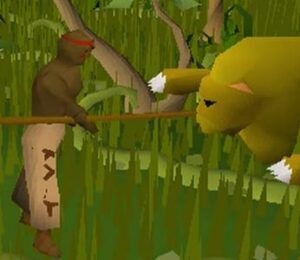Farming in RuneScape is a skill where you can grow crops. The plants you row and crops you harvest can allow you to train other skills or provide the items you can use while training other skills. Even when you use the items in the skills, you still stand a chance to make a profit.
Here are the skills that are helped by farming and how the skill training is helped through farming.
Cooking: Farming produces vegetables that can be cooked or used in cooking. The most common in cooking are potato, tomato, and sweetcorn. Potatoes, tomatoes, and sweetcorn are used in making potato toppings. Tomatoes are also used in making pizzas. Some of the potato toppings and pizzas heal a lot of hitpoints and thus are highly valued by players. Different types of hops can be grown and used in brewing. Redberries, grown in bush farming, are used for baking a redberry pie. Oranges and some other fruits are used in gnome cooking.
Herblore: There are five herb patches in RuneScape, where currently seventeen types of herbs can be grown from seed and raised. Growing herbs allows you to be able to train herblore less expensively, in many cases allowing you to even make a profit.
Some secondary ingredients used in Herblore are obtainable through the farming skill. Limpwurt roots can be grown in a flower patch. What is convenient about the limpwurt is that the herb patches and flower patches are right next to each other. This makes it easy to grow limpwurt while growing herbs.
Bush farming offers some good secondary ingredients for herblore. Jangerberries, White berries, and Poison Ivy berries are obtained from their respective bushes grown in bush patches. Yew Roots and Magic Roots are obtained through RuneScape tree farming when a yew or magic tree stump is dug from a tree patch. Cactus spines are grown in the cactus patch in Al Kharid and Nightshade is obtained for making weapon poison from growing Belladonna in the Belladonna patch in Draynor Manor. Coconut milk is obtained from coconuts, which are grown in a fruit tree patch.
Thieving: Farming does not produce anything to help you in thieving, but in your quest to obtain seeds, you will gain thieving experience by pickpocketing the master farmers and stealing from the seed stalls.
Crafting: Magic roots can be spun into magic string used for stringing nature amulets. Jute fibres are obtained by planting jute seeds in a hops patch and are woven into sacks using a loom. Willow branches can be obtained by using secateurs on a willow tree. A willow tree produces a maximum of six branches, with one branch growing every five minutes after checking the health, chopping down the tree, or harvesting its branches until there are six branches. Use willow branches on the loom to make a basket.
Woodcutting: Oak, willow, maple, yew and magic trees can be grown and harvested for their logs. Leaving the stump in the patch allows the tree to respawn and be harvested again. This is especially helpful if you are growing a yew or magic tree in Tree Gnome stronghold, next to the magic tree and yew trees that are by the bank. That way, you have your own tree to chop at when the other trees are down.
Fletching: Tree roots can be made into crossbow strings and wood obtained from trees can be used in fletching. Tree roots, however, are best used in making supercompost as there is a greater return in value with supercompost.
Summoning: Last but not least, farming can be the source of tertiary ingredients for summoning pouches. Marigolds, grown with level 2 farming in a flower patch, are used in making bull ant pouches. Guam can be grown at level 9 farming in an herb patch and used for macaw pouches. Evil turnips are grown in the evil turnip patch in Draynor manor. Bananas and willow branches are also used in summoning pouches.
So you see, farming is a skill that not only is good to train but also is very helpful when it comes to leveling other skills in RuneScape.




